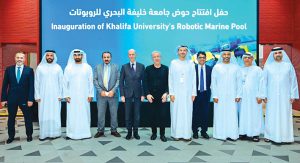ABU DHABI / WAM
Khalifa University of Science and Technology on Tuesday announced the inauguration of Khalifa University Marine Studies and Research Lab, the region’s first-ever advanced robotics research facility equipped with wave and stream generation facilities. Khalifa University’s Centre for Autonomous Robotic Systems (KUCARS) and Stanford University have also announced they have collaborated to explore the use of marine robotics for sustainable ocean ecosystems, including removing plastics to curb pollution.
The collaboration was part of a memorandum of understanding (MoU) that was signed by Professor Sir John O’Reilly, President of Khalifa University, and Professor Oussama Khatib, Director of Stanford Robotics Laboratory (SRL), in the Computer Science Department at Stanford University.
The Marine Studies and Research Lab at Khalifa University allows testing robots under a controlled environment that simulates the adverse underwater environmental conditions of the sea. The pool includes a wave generator, a flow current generator, underwater and overhead tracking systems, and an overhanging (gantry-type) mechanism covering the entire width of the pool. The OceanOneK robot, designed and built by a Stanford University team led by Dr Khatib, also made its Abu Dhabi debut and demonstrated its capability in retrieving plastic waste in the Khalifa University marine robotics pool.
The MoU will facilitate research and development of marine robotics systems for sustainable marine ecosystem applications, such as ocean monitoring, ocean cleaning, and deep-water exploration.
Dr Arif Sultan Al Hammadi, Executive Vice-President of Khalifa University, said, “Khalifa University’s Marine Robotics Lab, one of the most important research facilities and the first-of-its-kind in the region, will develop marine studies and research in the UAE and the region. The new facility enhances the UAE’s research capabilities and places it at the forefront of countries in research and development in this field.”
The Marine Robotics Pool will allow for extensive and controlled testing of marine robotic vehicles, including underwater, surface, autonomous or remotely tele-operated devices. Potential applications of marine robots include underwater cleaning of plastics, coral reef inspection, and critical infrastructure inspection.
Professor Lakmal Seneviratne, Director of KUCARS, said, “Our researchers are already developing autonomous robots for various land, air and marine applications. Recently, KUCARS researchers have applied for patents on five innovative robotics solutions for these applications.”
 The Gulf Time Newspaper One of the finest business newspapers in the UAE brought to you by our professional writers and editors.
The Gulf Time Newspaper One of the finest business newspapers in the UAE brought to you by our professional writers and editors.
